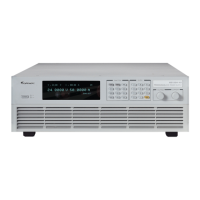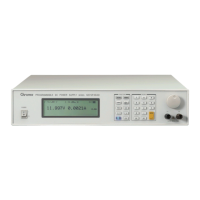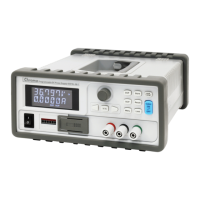Do you have a question about the Chroma 62150H-1000 and is the answer not in the manual?
Instructs on inspecting the package for damage or missing accessories after unpacking.
Details essential preparation steps before operating the power supply, including connection and ventilation.
Outlines the power requirements, including voltage ratings and input connection specifications.
Lists the maximum input power requirements for different models of the 62000H Series.
Explains how to connect the power supply to the AC line input, including safety procedures.
Guides the user through the power-on sequence, including self-tests and initial display.
Introduces manual and remote operation methods, focusing on front panel controls.
Explains two methods for setting the output voltage and current in CV and CC modes.
Describes how to configure system settings such as GPIB address, output setup, and protection.
Covers system setup configurations like APG, Buzzer, and Power On Status.
Configures output parameters such as voltage/current limits and slew rates.
Allows setting the minimum and maximum limits for the output voltage, with warnings for exceeding ranges.
Allows setting the minimum and maximum limits for the output current, with warnings for exceeding ranges.
Enables operation of multiple power supplies in series or parallel configurations for increased output.
Configures the operation mode as Master or Slave for series/parallel setups.
Details the complete protection functions, divided into user-settable and auto-detected classes.
Configures the Over Voltage Protection (OVP) point, which turns off output when voltage exceeds the set limit.
Configures the Over Current Protection (OCP) point, which turns off output when current exceeds the set limit.
Configures the Over Power Protection (OPP) point, which turns off output when power exceeds the set limit.
Handles Over Temperature Protection (OTP), turning off output when internal temperature limits are reached.
Provides calibration functions for voltage, current, APG voltage, and APG current.
Details hardware requirements and setup for calibrating voltage output and measurement accuracy.
Lists the necessary hardware, such as a DVM, for performing voltage calibration.
Shows the wiring diagram for setting up voltage calibration with a DVM.
Provides a step-by-step procedure for calibrating voltage output and measurement using a DVM.
Details hardware requirements and setup for calibrating current measurement.
Lists the necessary hardware, including a DVM, current shunt, and electronic load, for current calibration.
Shows the wiring diagram for setting up current measurement calibration with required devices.
Provides a step-by-step procedure for calibrating current measurement using a DVM and current shunt.
Details hardware requirements and setup for calibrating the programmed current output.
Lists the necessary hardware for calibrating the programmed current output.
Shows the wiring connection for calibrating the programmed current output.
Provides a step-by-step procedure for calibrating the programmed current output.
Details hardware requirements and setup for APG voltage calibration.
Lists the necessary hardware, including a DVM and DC power supply, for APG voltage calibration.
Shows the wiring connection for APG voltage calibration.
Provides a step-by-step procedure for calibrating APG voltage using DVMs.
Details hardware requirements and setup for APG current calibration.
Lists the necessary hardware, including a DVM and DC power supply, for APG current calibration.
Shows the wiring connection for APG current calibration.
Provides a step-by-step procedure for calibrating APG current.
Describes the LIST MODE for programming output sequences, including program structure and settings.
Details how to set a run time program using V_STEP MODE.
Configures the settings for V_STEP MODE: Start Voltage, End Voltage, and Run Time.
Sets the initial voltage for the V_STEP MODE program.
Sets the final voltage for the V_STEP MODE program.
Sets the duration for the V_STEP MODE program.
Introduces remote operation capabilities using interfaces like USB, GPIB, Ethernet, and Serial.
Provides an overview of inspection and troubleshooting procedures for the power supply.
Lists common operational problems, their causes, and suggested resolutions.
| Brand | Chroma |
|---|---|
| Model | 62150H-1000 |
| Category | Power Supply |
| Language | English |


